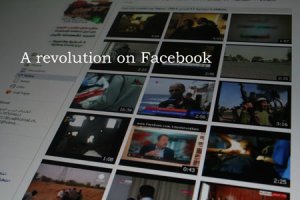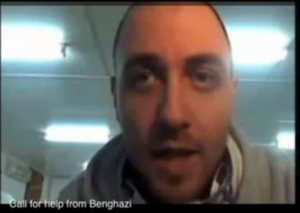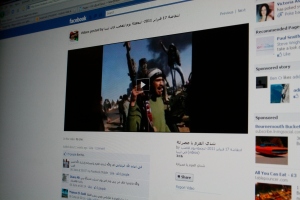Facebooking the revolution
“He was a close friend of mine; he was my room mate in Bournemouth where we studied together. I was just watching the news one night and I saw him lying there.”
Most people use social media sites to update friends on their life, emotions and daily trivia. For the UK’s Libyan community these sites have brought the grim reality of a civil war directly into their homes.
Youtube, Facebook and Twitter began to fill with videos of protests from the start of demonstrations in Libya, protests which turned into intense inner-city fighting. This footage spread, despite the fact that early in the uprising foreign journalists were largely absent and internet access had been blocked, however a small group of people were able to get videos out of the embattled cities.
For British-Libyans these videos are a valuable way to know what’s happening to loved ones still in the country. Assistant manager of Café@Meet, a Bournemouth internet café, Saad Nafo, 31, experienced this in a tragic fashion. Whilst watching the news he saw a video filmed by the rebels of people who had died in the fighting, and on one of the mortuary beds was a face he recognised. “He was a close friend of mine; he was my room mate in Bournemouth where we studied together. I was just watching the news one night and I saw him lying there.”
Sitting in the calm café on a warm English summer day, it couldn’t seem further from the conflict, but from here Saad was in regular contact with people who “were in the middle of the events, they came back to send the videos and then they go back to continue demonstrating.”
Spreading the message
Thanks to their computer knowledge and Libyan contacts Saad and several of his friends helped to spread the message of the revolution out of their internet café in Bournemouth. Saad, originally from Benghazi which is now the rebel stronghold, said: “There were about 5 or 6 people [in the cafe] that were working hard every night. We talked to people who managed to get the internet through satellites.”
People like Saad and his friend Diab Almeel, 36, manager of Café@meet, tried to get the footage out to as many people as possible. Whilst they were downloading and uploading onto social network sites popular with Libyans, they were also becoming trusted sources for major news channels. Saad said that in the beginning “some of the news like BBC and Sky didn’t know about the Facebook pages and they didn’t check the revolution page and so we were downloading videos from there and sending to them. I’ve seen videos that I sent myself to Al Jazeera, to BBC, to Sky.”
One of the information gatherers Saad was in touch with was Mohammed Nabbous, a man a Der Spiegel article said “might be the most important person in the revolution”. This was because he recorded the reality of the uprising and he was able to get it out of the city. He was killed on the 19th March, two weeks after that article was published.
Saad said: “He was one of my friends and a neighbour as well in Benghazi. He managed to set up CCTV cameras in Benghazi at the beginning of the events and he was streaming videos from there.” Saad explained how Mohammed Nabbous and those like him were capable of bypassing Gaddafi’s strict internet crackdown. “There is another way to use the internet. I used to work in an internet café in Libya and we’d buy a receiver from America, like a satellite TV receiver but we would use it for the internet.” It was forbidden to own this technology and those hiding it faced severe punishment if discovered. When the uprising began this type of contraband meant that people like Mohammad Nabbous could communicate with the outside world.
The Media War
Saad and his friends felt that it was important to ensure that these videos were as widely available as possible, as a way to counteract Gaddafi’s assertions that the rebels were drugged, murderous and delusional members of Al-Qaida. Diab explained “I am always trying to deliver the message and help in the propaganda war, because that is another war as well”. Saad said: “Without Facebook we would find it so difficult to show the real truth and to make people believe that this is a revolution, and it’s not Al-Qaida as the regime claim.”
Facebook pages such as ‘The Revolution of the 17th February 2011’ and ‘The Lighthouse’ became important portals for the dissemination of information. Saad explained to me how ‘The Revolution of the 17th February 2011’ became very popular very quickly. “When I joined this page there was 50 users and now there are about 150,000. It was 300,000 [early in the uprising] but the government started to kidnap people who were on this page. They kidnapped people who talked to us over the phone about it.”
The assertions that people in Libya were kidnapped because of a Facebook group they belong to cannot be verified, however external organisations have documented cases of missing persons who had links to the anti-Gaddafi movement. Amnesty International released a report at the end of March detailing 30 people that had disappeared because of their connections to the rebel forces, a number Amnesty International said represented “a small proportion of the total number of people who have been detained or have disappeared in the custody of Colonel al-Gaddafi’s forces”.
The reliability of the news both sides were relaying soon became a critical issue. Saad and others helping the opposition realised it was important to try and verify their claims as much as possible. Those posting on Facebook about fighting, disappearances, protests, or deaths often tried to verify the information, usually with videos but “sometimes they say it’s true or sometimes they say it’s true on other channels or they say it’s true because of eye witnesses”.
To those inside Libya the accuracy of such information on a Facebook group can be a matter of life or death, as they have become an important resource in knowing where the fighting is taking place. Saad translated the online news from Misurata for me: “Gaddafi’s troops, 28 minutes ago they are still using Grad [rockets]. West of Misurata, they are using heavy artillery and rockets”.
Two-way communication
The value of social media and the internet to the uprising is an issue that observers have been eager to look into. Charlie Beckett, director of LSE’s media think-tank Polaris, said: “The Libyans outside of Libya are a very important group and this communication is valuable in terms of money, fund raising and especially lobbying. The connections that ex-pat Libyans have are vital and the information and images they can see thanks to social media motivates them and gives them material to lobby governments and the media.”
Yet the importance of social media shouldn’t be overstated, as: “It doesn’t matter how good the social media is if the government is still going to be willing to shoot everyone. People forget that Egypt was not inevitable, at one point it was on a knife edge when the Pro-Mubarak supporters organised against the demonstrators.”
The ability for people outside Libya to talk and interact with those inside the country works both ways. Rida Benfayed used to be an orthopaedic surgeon in the Oxfordshire town of Banbury, now he is in Tobruk and at the heart of an operation to connect with ex-pat Libyans who have the skills the rebels need. This has become a huge project, and is almost entirely carried out through Skype on his computer. “I ask every Libyan, across many countries, through my Skype I ask them to help in the revolution. It is beyond the imagination of everybody how we got this circle [of people together] in such a short space of time.”
Across the Generations
The role of the internet in the Libyan uprising coincides with a common theme of the Arab Spring, that a large proportion of the protestors and fighters have been young and computer literate. This raises a crucial generational question – is the online information only accessible by the younger generations of the Libyan community?
Saad told me: “Older people like my father, he uses the internet now, but he doesn’t know as much as we know. That’s where my sister comes in; he just brings her and says: ‘Can you just open that page? Can you show me this?’ So my sister just navigates it and reads for him.” This is an important point in the Libyan community, where family ties are traditionally very strong. “Even if you are 30 you could still live with your family. So the son will come home and tell them I’ve read that, and that, and that online.” This means that whilst the Libyan youth are an essential factor in spreading the information across the world, the messages and videos are still reaching most Libyan people, regardless of their age.
In fact many of the organisers and leaders of the opposition movement in the UK are those who left Libya in the 80s and 90s as political exiles and opponents of Gaddafi. Saad Essadeg, 51, is a prominent member of Manchester’s Libyan community, and he exemplifies this group of politicised older men, however he recognises that the uprising owes a lot to the Libyan youth movement. “The youngsters this time have embarrassed us, because we tried before in my time. We tried, but we failed.”
In Diab’s view the ability of young Libyans to utilise the internet was crucial. “This revolution happened because of the youngsters, the youth of Libya who’ve done it…the youth who are using Facebook, technology, Twitter and Youtube to deliver their message to the world.”




Comments
One Response to “Facebooking the revolution”Trackbacks
Check out what others are saying...[…] example in my article on social media use during the uprising I was told that people in Libya were getting arrested and persecuted for being members of a Facebook […]